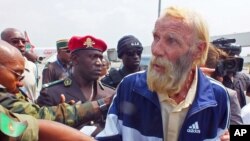Robert Nitsch Eberhard, a German citizen who was kidnapped by suspected Boko Haram militants last July, arrived in Cameroon after gaining his freedom. Neither German nor Cameroonian officials are explaining how he was released.
Robert Nitsch Eberhard looked tired, hungry and unkempt when he arrived in Yaounde on Wednesday. He told VOA he lost 50 kilograms in weight while in captivity.
"Until the last minute, I did not know if I will survive or I will not survive," he said. "It was for me a big problem because there was darkness, totally dark and then you see nobody around you and this is a big problem to say if I will survive or I will not survive."
Eberhard said he was kept in a dirty room during his entire stay in captivity, and said that he had been saved from the mouth of a lion. It was not clear whether the lion was figurative or real.
"You had a long time where nobody talks with you," he said. "Nobody. So soon you go there you die."
The German ambassador to Cameroon, Klaus-Ludwig Keferstein, thanked Cameroon's government for securing Eberhard's release but would not divulge how it happened.
Eberhard was working as a teacher in northeastern Nigeria last July when he was kidnapped by suspected Boko Haram fighters.
Sometime in the past few days, he was released and brought to Maroua, near Cameroon's border with Nigeria, in the company of a top official in Cameroon's presidency, Ferdinand Ngo Ngo. From Maroua, he was brought to Yaounde on a military flight.
The group has kidnapped hundreds of people in the past year, most of whom were Nigerians.
More recently, officials in Cameroon say Boko Haram militants kidnapped at least 60 people, including children, in a cross-border raid from Nigeria on Sunday.
The officials say several people who tried to stop the militants were killed and about 80 homes were burned to the ground.
Cameroon's Information Minister Issa Tchiroma Bakary called the kidnappers barbaric and lawless and said nothing can stop them from killing.
The kidnappings came a day after Chad sent thousands of troops into Cameroon to help fight Boko Haram — the Nigerian Islamic militant group that African officials say is quickly becoming a threat to the entire region.
Boko Haram has been seizing territory along the border between Nigeria and Chad. It recently took control of a military base near the shores of Lake Chad, killing a number of villagers.
Gunmen believed to be from Boko Haram have attacked the town of Gombi where residents said the militants exchanged fire with soldiers stationed there.
P.P. Elesha, a spokesman for Adawama state Governor Bala James Ngillari, confirmed the attack to VOA's Hausa service and said the governor assured residents everything possible is being done to restore normalcy.
Adawama is one of three northeastern Nigerian states where President Goodluck Jonathan declared a state of emergency in May 2013 as part of an effort to battle Boko Haram. Late last year, security forces and vigilantes pushed the militants from Gombi and the nearby towns of Mubi and Hong.
Bus station bomb kills 4
Meanwhile, a suicide bomber killed at least four people and wounded at least 25 others in the northern Nigerian city of Potiskum.
Local police say the bomber detonated a car filled with explosives at a bus station early Sunday. There was no immediate claim of responsibility, but suspicion fell on Boko Haram, which often targets bus stations and other public gathering spots.
The unrest in the north has become a central issue in Nigeria's presidential election, set for February 14. Many Nigerians feel incumbent President Goodluck Jonathan has done too little to stop the militants, while some analysts question whether polls can be held at all in the northeastern states where Boko Haram is active.




